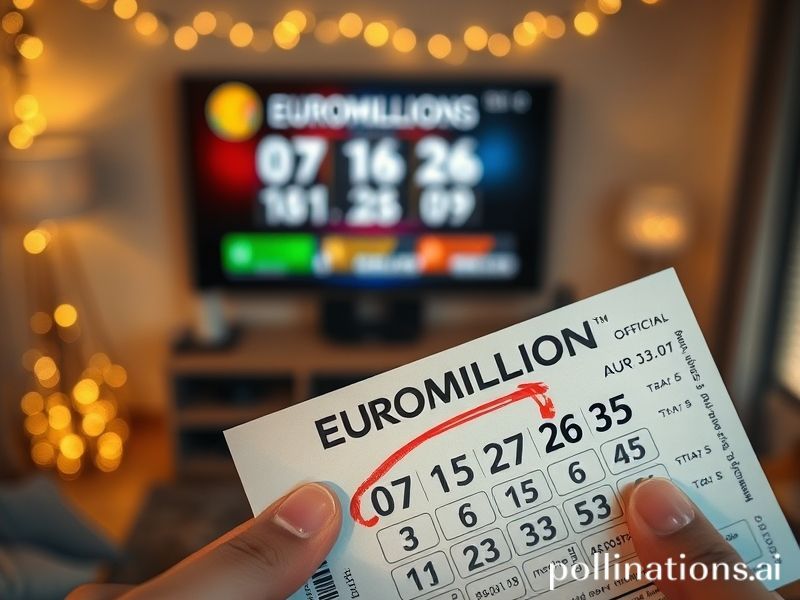Euro Millions Results: How One Lucky Ticket Quietly Bankrolls Europe’s Delusions
Euro Millions Results: A Global Audit of Hope, Taxation, and the Art of Pretending Tuesday Is Special
LISBON—Every Tuesday and Friday at 20:45 CET, a cluster of television cameras in a nondescript studio here performs humanity’s most reliable miracle: turning spare change into colossal disappointment at continental scale. The latest Euro Millions draw—€144 million jackpot, rolled over four times—didn’t so much bestow fortune as confirm, again, that probability is the last honest accountant left in Europe.
The winning constellation (5, 12, 27, 42, 49, with Lucky Stars 2 and 6, for those keeping morbid scorecards) was extracted from the same plastic bubble that has, over two decades, redistributed roughly €100 billion across nine European tax jurisdictions. That is roughly the GDP of Kenya, minus the weather. One Portuguese marketing manager pocketed the full jackpot, instantly becoming richer than 12 of the EU’s smaller member states’ annual defense budgets combined. Somewhere, a Baltic general feels personally attacked.
Yet the real winners remain the finance ministries that quietly siphon 20–40 percent of every ticket in so-called “good-cause” levies—an Orwellian phrase that, in practice, means “whatever the treasury fancies this fiscal year.” Spain’s Hacienda alone collected €1.4 billion from Euro Millions in 2023, enough to fund rural broadband or, more realistically, half a dozen regional corruption scandals. France earmarks its cut for hospitals; the UK used to pledge to “Olympic legacy” projects until Brexit, at which point the money was reclassified as “sovereign spontaneity.”
Globally, the draw is broadcast from Lagos betting shops to Manila call-center break rooms, where expats huddle around glitchy streams like refugees seeking asylum from economic reality. Cryptocurrency exchanges even offer synthetic “EuroMillions tokens,” letting speculators short the dreams of strangers without the inconvenience of buying an actual ticket. Wall Street analysts call this “democratizing volatility”; the rest of us call it Tuesday.
The geopolitical subplot is richer than the jackpot itself. Because the prize is paid in euros, every rollover quietly functions as a stress test for the single currency. When the pot swells, Greek newspapers run breathless editorials insisting that “our turn is coming,” a phrase they also reserve for debt restructuring negotiations. Meanwhile, British tabloids—still furious about the entire concept of Europe—frame any UK winner as “sticking it to Brussels,” conveniently forgetting that the sterling equivalent is calculated by the same traders they blamed for the 2008 crash.
Humanitarian agencies, ever alert to new metaphors, now compare the lottery to climate finance: a promise that if enough small sacrifices are pooled, catastrophe might be averted by one magical transfer. The difference, of course, is that climate change actually happens. The odds of winning Euro Millions remain 1 in 139,838,160—statistically indistinguishable from spontaneously evolving gills, though markedly worse for the planet.
Psychologists note that ticket sales spike whenever global headlines pivot from war to inflation, as though poverty were a dial we could simply rebrand. During the pandemic, lockdown Zoom calls featured split screens of ICU dashboards and lottery apps; the same thumb that refreshed death tolls also clicked “Quick Pick.” Hope, it turns out, is the most contagious variant.
Tonight’s draw will reset to €17 million, a sum now described by official press releases as “modest,” a word that would still clear the external debt of Belize. The Portuguese winner has already hired security, because nothing says “blessed” like needing armed guards to visit the corner café. Across the continent, millions of Europeans will queue again, clutching receipts that double as metaphysical IOUs. Statistically, they’re buying disappointment. Politically, they’re funding the state. Existentially, they’re auditioning for the next news cycle: a brief reminder that, in the grand casino of modern life, the house always wins—and the house, dear reader, is us, pretending the croupier speaks with a French accent just to feel continental.







